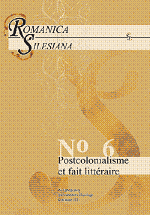L’hybridité dans "L’Écrivain public" et "L’Enfant de sable" de Tahar Ben Jelloun
Hybridity in "L'Ecrivain publik" and "L'Enfant de sable" by Tahar Ben Jelloun
Author(s): Magdalena Zdrada-CokSubject(s): Literary Texts
Published by: Wydawnictwo Uniwersytetu Śląskiego
Keywords: Hybridity; tale; postmodern autobiography; Moroccan novel in French
Summary/Abstract: The article aims to analyze L’Écrivain public and L’Enfant de sable by Tahar Ben Jelloun, focusing on the issue of hybrydity which is discussed from the postcolonial and postmodern perspective (Bhabha, De Toro). The analysis concentrates on the oriental tale which deconstructs the paradigm of the novel and the autobiography. However, the article also depicts that Tahar Ben Jelloun derives his ideas from the oral tradition so as to, similarly as Jorge Luis Borges, give his works an intertextual and intercultural dimension. Through the nomadic structure of the tale, which is present both in the novel and in the autobiography, the writer rejects the idea of a conservative and monolithic Moroccan society and opposes stereotypes.
Journal: Romanica Silesiana
- Issue Year: 2011
- Issue No: 6
- Page Range: 160-180
- Page Count: 21
- Language: French

